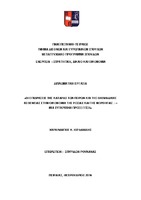| dc.contributor.advisor | Ρουκανάς, Σπυρίδων | |
| dc.contributor.author | Ιορδανίδης, Χαράλαμπος Κ. | |
| dc.date.accessioned | 2017-09-20T08:40:05Z | |
| dc.date.available | 2017-09-20T08:40:05Z | |
| dc.date.issued | 2016-02 | |
| dc.identifier.uri | https://dione.lib.unipi.gr/xmlui/handle/unipi/9979 | |
| dc.description.abstract | Σε πολλές χώρες, οι φυσικοί πόροι δεν έχουν πάντα θετική επίδραση στην οικονομική μεγέθυνση και την βελτίωση του βιοτικού επιπέδου των κατοίκων τους. Η βιβλιογραφία σχετικά με την «κατάρα των πόρων» παρουσιάζει μια ζοφερή σχέση: οι χώρες με μεγάλα αποθέματα φυσικών πόρων βιώνουν γενικά χαμηλότερη οικονομική μεγέθυνση σε σχέση με άλλες χώρες. Ωστόσο η κατοχή φυσικών πόρων μπορεί να είναι είτε ευλογία είτε κατάρα για μια χώρα, ανάλογα με τον τρόπο που θα υλοποιηθεί η εκμετάλλευση τους καθώς και το γενικότερο οικονομικό, κοινωνικό και πολιτικό περιβάλλον που θα διαμορφωθεί. Συχνά η κατοχή και διαχείριση φυσικών πόρων συνδέεται με αυξημένα επίπεδα διαφθοράς, έλλειψη δημοκρατικών θεσμών, χαμηλούς ρυθμούς οικονομικής ανάπτυξης.
Στην συγκεκριμένη εργασία πραγματοποιείται μια μελέτη για την ύπαρξη ή μη της κατάρας των πόρων και της ολλανδικής ασθένειας υπό το πρίσμα της Διεθνούς Πολιτικής Οικονομίας σε δυο τελείως διαφορετικές περιπτώσεις, της ρωσικής οικονομίας και της νορβηγικής οικονομίας. Μελετώνται τα βασικά μακροοικονομικά οικονομικά μεγέθη των δύο χωρών, η διαχείριση των πόρων και των εσόδων που προέρχονται από αυτούς καθώς και οι επιπτώσεις που προκαλούν οι αλλαγές των τιμών του πετρελαίου και ειδικότερα οι μειώσεις.
Σε συνέχεια της μελέτης και της έρευνας διατυπώνονται συμπεράσματα για την επίδραση της κατάρας των πόρων σε κάθε μία οικονομία, εντοπίζονται τα κοινά τους στοιχεία και επισημαίνονται οι διαφορές που υπάρχουν στα δυο οικονομικά μοντέλα. Τέλος παρουσιάζονται προτάσεις αντιμετώπισης των αρνητικών συνεπειών της κατοχής φυσικών πόρων. | el |
| dc.format.extent | 91 | el |
| dc.language.iso | el | el |
| dc.publisher | Πανεπιστήμιο Πειραιώς | el |
| dc.rights | Attribution-NonCommercial-NoDerivatives 4.0 Διεθνές | * |
| dc.rights.uri | http://creativecommons.org/licenses/by-nc-nd/4.0/ | * |
| dc.title | Οι επιδράσεις της κατάρας των πόρων και της ολλανδικής ασθένειας στην οικονομία της Ρωσίας και της Νορβηγίας : μια συγκριτική προσέγγιση | el |
| dc.type | Master Thesis | el |
| dc.contributor.department | Σχολή Οικονομικών, Επιχειρηματικών και Διεθνών Σπουδών. Τμήμα Διεθνών και Ευρωπαϊκών Σπουδών | el |
| dc.description.abstractEN | Worldwide, natural resources have an effect on economic growth and improving the standard of living of their inhabitants. In some occasions this effect could be negative. More specifically, the "resource curse" as it is referred to the literature, presents the following grim relationship: countries with large reserves of natural resources generally experience lower economic growth than other countries. The possession of natural resources can be either a blessing or a curse for a country, depending on the way they implemented their exploitation as well as the general economic, social and political environment to be configured. We often notice that the ownership and the management of natural resources is associated with elevated levels of corruption, lack of democratic institutions and low economic growth. This thesis examines if the resource curse and Dutch disease exists at two completely different economies, the Russian and the Norwegian, in the light of International Political Economy. Moreover, we perform a study about the key macro-economic figures of the two countries, the resource management, the revenue derived from them, as well as the effects caused by changes in oil prices, particularly the reductions. Furthermore, we present the conclusions about the effect of the curse of resources in each economy, considering their similarities and highlighting the differences in the above economic models. Finally, we present some proposals to address the negative consequences of the natural resources. | el |
| dc.contributor.master | Ενέργεια: Στρατηγική, Δίκαιο & Οικονομία | el |
| dc.subject.keyword | Φυσικοί πόροι | el |
| dc.subject.keyword | Κατάρα των πόρων | el |
| dc.subject.keyword | Ολλανδική ασθένεια | el |
| dc.subject.keyword | Διεθνής πολιτική οικονομία | el |
| dc.subject.keyword | Ρωσία | el |
| dc.subject.keyword | Νορβηγία | el |
| dc.subject.keyword | Οικονομική μεγέθυνση | el |
| dc.subject.keyword | Πλούτος | el |
| dc.subject.keyword | Φτώχεια | el |
| dc.subject.keyword | Βιοτικό επίπεδο | el |
| dc.subject.keyword | Μακροοικονομικά μεγέθη | el |
| dc.subject.keyword | Natural resources | el |
| dc.subject.keyword | Resource curse | el |
| dc.subject.keyword | Dutch disease | el |
| dc.subject.keyword | International political economy | el |
| dc.subject.keyword | Norway | el |
| dc.subject.keyword | Russia | el |
| dc.subject.keyword | Economic growth | el |
| dc.subject.keyword | Wealth | el |
| dc.subject.keyword | Poverty | el |
| dc.subject.keyword | Standard of living | el |
| dc.subject.keyword | Macroeconomic fundamentals | el |



